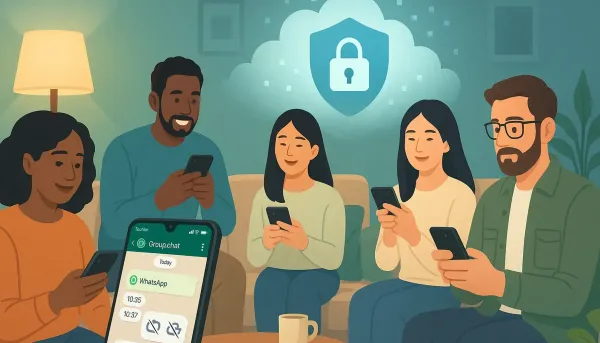
WhatsApp's Advanced Privacy Features- A Game Changer for Users
In an era marked by escalating concerns over data privacy and security in digital communication, WhatsApp has made notable strides with its latest feature: Advanced Chat Privacy. This new layer of protection aims to address user anxieties surrounding sensitive conversations, particularly within group settings where not all participants may share the same level of trust. With privacy breaches becoming increasingly common, it is imperative to explore the implications and functionalities of these developments critically.
Key Features of Advanced Chat Privacy
WhatsApp’s Advanced Chat Privacy introduces several notable enhancements designed to restrict content sharing:
1. Inhibiting Chat Exports
Users can prevent others from exporting chat histories. This restriction applies equally to both one-on-one and group chats, safeguarding vital discussions from being stored externally.
2. Disabling Automatic Media Downloads
The feature allows users to stop shared media files, including images and videos, from auto-downloading to recipients’ devices. This action limits the exposure of potentially sensitive material.
3. Restricting AI Usage
With the rise of AI-driven applications that can analyze message content for targeted services, WhatsApp has taken a bold step to disable the usage of message data for AI features in conversations where privacy is enabled.
4. Comprehensive Group Settings
Particularly useful in groups where relationships are not well-established, this feature fosters a sense of security, encouraging open dialogue among participants discussing sensitive issues such as health-related matters or community engagement projects.
5. User Accessibility
The feature can be easily activated by users through a few simple taps—selecting the chat name and toggling the Advanced Chat Privacy option on. Once enabled, these restrictions apply to all participants, ensuring collective adherence to the privacy standards set by the chat owner.
6. Future Enhancements
WhatsApp has signaled that this is merely the first iteration of Advanced Chat Privacy. Future updates may include additional barriers against privacy breaches, such as options to block screenshots.
Evolution of Privacy Features in WhatsApp
WhatsApp’s commitment to privacy has evolved impressively over the years:
-
End-to-End Encryption: Launched in 2016, this feature ensured that only the sender and recipient could read messages, making a significant impact on how communication security was approached.
-
Encrypted Backups: In late 2021, WhatsApp introduced end-to-end encrypted backups, allowing users to back up their chat histories without compromising privacy.
-
Disappearing Messages: Functionality allowing messages to self-destruct improved privacy control. This feature has been continuously enhanced, offering users the option to set disappearing messages as the default for new chats.
-
Chat Locks and Location Privacy: Features like the ability to lock chats with passwords and conceal location data during calls have been rolled out recently, further solidifying WhatsApp’s proactive stance on user security.
Contextualizing the Importance of Advanced Chat Privacy
According to recent analyses presented by cybersecurity research firms, communications platforms can be vulnerable to various cybersecurity threats. This has been exacerbated by broader societal shifts towards remote interactions and digital healthcare solutions, especially during and post-pandemic. With cases of misuse on platforms experiencing a steady rise, users must be empowered with greater controls over their communications.
Challenges and Limitations
While the Advanced Chat Privacy mitigates certain risks, it is crucial to recognize its limitations:
-
Screenshots and Manual Downloads: As WhatsApp acknowledges, determined users still retain the ability to capture information via screenshots or manually download media. Despite these new privacy features, individuals must remain increasingly vigilant about whom they converse with.
-
Social Engineering Attacks: Contextual information surrounding user habits and discussions can still be exploited through social engineering. Therefore, user education on recognizing manipulation tactics and fostering a strong cybersecurity hygiene is paramount.
Conclusion
WhatsApp’s Advanced Chat Privacy feature represents a significant advancement in the domain of communication security. It showcases an understanding that users must feel secure in their conversations, especially in digital contexts where leakage or unauthorized access could have tangible consequences. As user concerns around privacy continue to evolve, WhatsApp’s adjustments highlight a commitment to adapting and improving its offerings.
For cybersecurity professionals, this development serves as a reminder of the continual need to address user education about privacy practices. As messaging applications like WhatsApp become key tools for sensitive conversations, it will be critical to leverage these new features thoughtfully and responsibly while remaining alert to the ever-changing landscape of cybersecurity challenges.
With major moves in privacy features, WhatsApp is setting a benchmark for the industry, paving the way for more secure communication channels. Future iterations will need to maintain momentum, ensuring that users can engage on these platforms without compromising their privacy. As we witness further changes in digital communication paradigms, staying informed about these developments will prove beneficial.